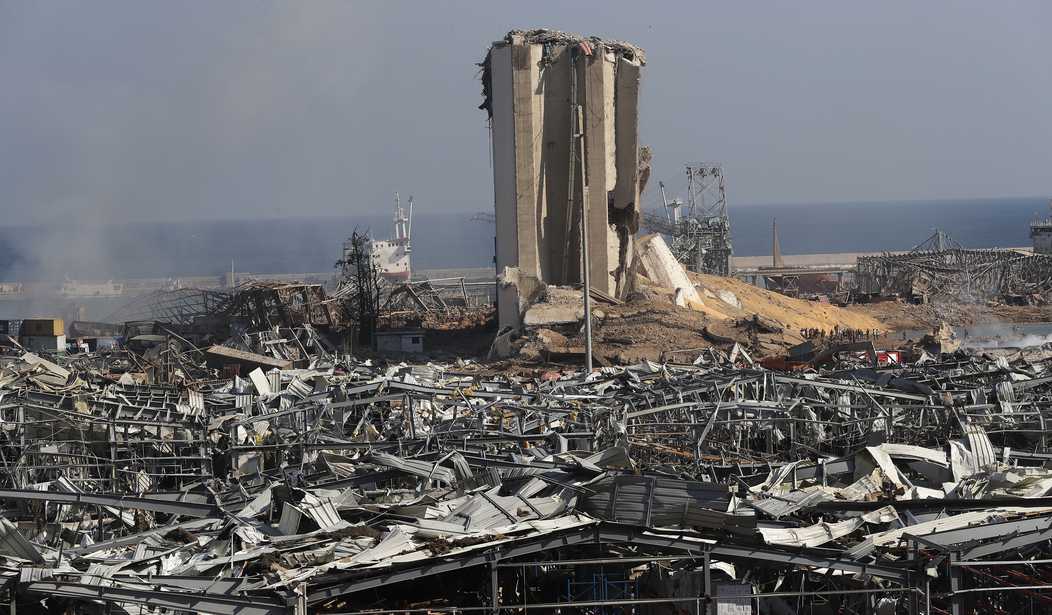Preliminary investigations by independent observers have found some very disturbing facts that appear to change the narrative on the cause of the massive explosion that damaged or destroyed much of the city of Beirut last Tuesday.
Careful study of video of the blast shot from multiple angles and from multiple sources indicate there was not one but two separate explosions, about 30 seconds apart, and that the second explosion was definitely not from ammonium nitrate.
In addition, the narrative being pushed by Hezbollah and their toadies in the Lebanese government is mostly misinformation. The story told by the terrorists is that the ship originated in Georgia and was bound for Mozambique to drop off a couple of thousand tons of ammonium nitrate. It stopped in Lebanon and was prevented from leaving port for six years because the ship wasn’t seaworthy.
One big problem with that tall tale: the region in Georgia from which the ammonium nitrate was said to have originated has only been exporting it for three years. And there’s more.
Second, as strategic analyst David Wurmser explained in a detailed forensic analysis of the blasts published over the weekend, Lebanese experts claim Beirut, not Mozambique, was always the ship’s true destination. The port inspectors who initially seized the Rhosus told a Lebanese television reporter that Iran paid for the ammonium nitrate cargo.
Wurmser noted Hezbollah controlled both Hangar 12 and Hangar 9, the site of the initial fire. Both hangars were located directly adjacent to the sea—prime real estate for parties keen to bring in and export items without having them examined or noticed by anyone.
As for Mozambique, officials there claim they had no knowledge of the shipment.
For more than a decade, Western authorities have been busting Hezbollah cells in their countries and confiscating thousands of pounds of ammonium nitrate.
Connecting the dots, Wurmser concludes Hangar 12 was not a storage area for a single shipment of ammonium nitrate transiting from Georgia to Mozambique. Instead, it was Hezbollah’s shipping dock for ammonium nitrate to its cells around the world.
The question of more than one blast appears to be cut and dried.
The second aspect of the devastation that points to the true significance of Hezbollah’s control of Lebanon is the fact that Hezbollah and Aoun are lying about the blasts. There were two blasts at the port, 28 seconds apart, not one.
As the videos of the blasts show, about half an hour after the fire broke out at Hangar 9, a first explosion occurred. Whereas the official story claims the blast came from fireworks stored at the warehouse, Wurmser and other experts dismiss this. The explosion, Wurmser explains, “produced thick whitish-gray ‘dirty’ smoke, consistent with some high explosives and even rocket fuel.”
Wurmser contends the second, and most destructive, blast was weapons-grade ammonium nitrate, although arguably a larger quantity than claimed.
Other experts aren’t so sure about the second blast being ammonium nitrate at all. It was apparently a different color from the first blast and might indicate the explosion of rocket fuel. Hezbollah has the largest arsenal of missiles in the world and Lebanese residents have been claiming for years that the terrorists have been storing missiles and their components in the Beirut port.
One thing is certain: we’ll never get the truth from Hezbollah. Following the blast, tens of thousands of Lebanese took to the streets to oust Hezbollah’s handpicked government. They were shot down in cold blood in the streets by members of the military and men in civilian clothes presumed to be Hezbollah militia.
Who are the armed men in civilian clothes mixed in with the uniformed military and firing live ammunition at the Lebanese demonstrators? pic.twitter.com/rd6WosHVR4
— Mike (@Doranimated) August 8, 2020
Next week, a special tribunal on the murder of Lebanon’s beloved former prime minister, Rafic Hariri, will hand down a verdict. Hariri, who was a victim of a car bomb in 2004, was killed because he was a Lebanese patriot who refused to kowtow to Hezbollah or Syrian President Assad. He paid for his defiance with his life.
The tribunal is expected to find four members of Hezbollah being tried in absentia guilty of planning and carrying out the murder. The verdict will pass virtually unnoticed in Lebanon because Hezbollah wants it that way — just like they want their flimsy narrative on the explosion to be accepted without question.










Join the conversation as a VIP Member